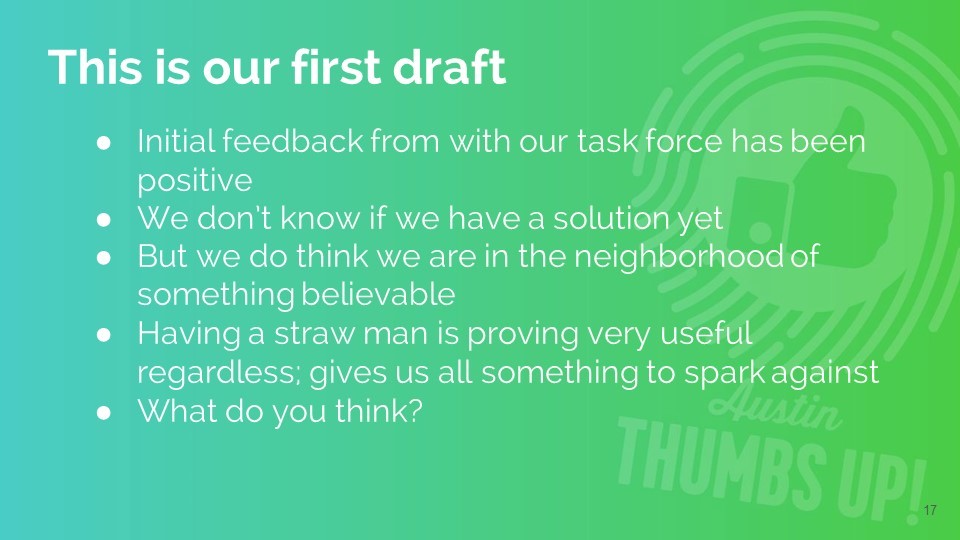Thank you for posting this information, especially the link to the full presentation.
In answer to the specific question that’s been posed, my personal view is that the phrasing on this slide is inarticulate but not itself a sign of anything nefarious. “Placeholder” is a neutral to positive phrase that I’d personally use instead of “straw man”, which as Skylar points out has negative connotations (at least to many people).
That said, looking through the whole presentation made me more negative about this proposed compromise, about which I was already skeptical after reading some Statesman articles on the topic. I am opposed to the idea of mandating fingerprint-based background checks for drivers, but I now think that this proposed compromise might be an even worse idea.
Why? Because this compromise looks like it’s built on a relatively complicated system of incentives/penalties, and I strongly believe that a primary consideration of any regulation should be to draft it to be as simple as reasonably possible. Generally speaking, the more complicated a set of regulations, the more it (i) favors incumbents, who actually understand how it works, over potential new competitors, (ii) has unintended consequences due to the inherent difficulty of understanding complexity, and (iii) is subject to ongoing tweaking that exacerbates points (i) and (ii). To be clear, some issues are by nature more complicated than others, so I’m not saying that every system of regulation can be “simple” - but the goal should be to be as simple as reasonably possible. In the case of the TNC’s, I think that either the pre-December regulatory framework or the ballot initiative proposal come reasonably close to that standard.
A specific concern that I have in this case is the degree to which the “Thumbs Up” proposal relies on incentives/penalties that boil down to “only a Thumbs Up driver can go to location XYZ.” I foresee and fear that such an idea has no natural limit and will lead to a series of future changes such as “only a Thumbs Up driver can pick up passengers late at night downtown.” It could very well end up as a de facto mandate for fingerprint based background checks, without the accountability of political leaders having to state, “we are voting to mandate fingerprint based background checks.”
As a voter, I care about this point because it’s tougher for me and others to get to the bottom of understanding where an official stands on the issue. As a consumer, I care because the complexity likely both directly increases prices through direct costs that are ultimately passed on to me and indirectly increases prices by discouraging new competitors.
Going back to the language of the slide, I’m concerned that “Thumbs Up” regulations will be something that City Council members are “sparking against” for years. I am also, to put it bluntly, skeptical that these requirements would be tweaked in a well-considered manner in the future. That skepticism is driven by the degree to which the initial ordinance mandating fingerprint based background checks relied on anecdotal examples of unacceptable lawbreaking without, so far as I can tell, much thoughtful consideration of costs versus benefits and whether the proposed changes would truly solve the underlying problem.
